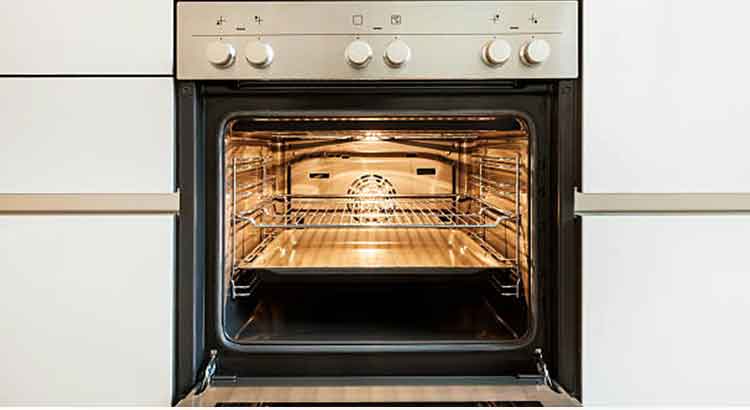Is your oven suddenly filling your kitchen with the unmistakable smell of burning plastic? You’re not alone. Many home bakers and cooks have encountered this puzzling issue, and we’re here to help you understand why.
The most common reason your oven smells like burning plastic is a spill or plastic item that has inadvertently made its way onto the oven’s heating element. These items can melt and produce that unpleasant odor, but don’t worry; we’ve got solutions for this and other common oven problems.
Curious to know why your culinary creations don’t always turn out as expected? Want to learn how to prevent that burning plastic smell from taking over your kitchen? In this article, we’ll explore seven common oven issues and the simple fixes that can help you bake and cook with confidence. From unexpected spills to temperature quirks, we’ve got you covered, so keep reading to uncover the secrets of a well-behaved oven.
Food Spills
We’ve all been there: the moment you open your oven, and a mysterious, unpleasant burning plastic smell fills the air. The culprit? Food spills. Accidents happen, and sometimes those lovely dishes we’re cooking bubble over and find their way onto the oven’s heating element. When this happens, you might notice a pungent, plastic-like odor that can be quite alarming.
How to Solve It: If you’ve got a food spill in your oven causing the odor, the solution is simple. Wait for your oven to cool down, then carefully remove any loose food particles or debris. For stubborn residue, use a mixture of baking soda and water to gently scrub the affected areas. Remember to be cautious and avoid using abrasive materials that might damage your oven’s interior. Keep your oven clean, and you’ll prevent that unpleasant scent from making future appearances.
Melted Oven Components
When your oven smells like burning plastic, it might not always be about food spills. Sometimes, the culprit is a melted component within your oven. This can happen when plastic cookware or other non-oven-safe items inadvertently find their way into the cooking chamber.
How to Solve It: The most effective way to address this issue is prevention. Always double-check your cookware before using it in the oven, ensuring it’s oven-safe. If you suspect a melted component in your oven, carefully inspect the oven’s interior. Look for any signs of melted plastic or foreign objects. If you find anything, safely remove it to prevent further odors and potential damage. Regularly examining your oven can help maintain a safe and odor-free cooking environment.
Self-Cleaning Cycle
The self-cleaning cycle on your oven is a convenient feature that helps keep your appliance in tip-top shape. However, it can also be the source of that perplexing burning plastic odor. During the self-cleaning process, your oven heats up to extremely high temperatures to incinerate any leftover food residue. If there’s any food debris or plastic cookware inside, it can melt and produce a not-so-pleasant scent.
How to Solve It: To avoid the smell of burning plastic during the self-cleaning cycle, make sure your oven is free of any leftover food or items that don’t belong. Remove oven racks, and check inside thoroughly. If you accidentally left any cookware inside, take it out. Run the self-cleaning cycle with an empty oven to let it do its job without unwanted side effects.
Heating Element Issues
Sometimes, the problem might not be about what’s inside your oven but rather the oven itself. If the heating element, which is responsible for heating the oven, malfunctions or gets damaged, it can create a strange, plastic-like smell.
How to Solve It: If you suspect heating element issues, it’s best to call a professional technician to inspect and repair your oven. Attempting to fix this on your own can be dangerous and might lead to further damage. Regular maintenance and prompt repairs can help prevent such issues from affecting your cooking experience.
Foreign Objects
Sometimes, the mystery of the burning plastic smell can be traced back to unexpected guests in your oven. It’s not uncommon for small, forgotten items to find their way into the oven’s interior. These could be anything from plastic utensils and packaging materials to stray kitchen tools.
How to Solve It: If you’re dealing with this issue, the first step is to safely turn off the oven and unplug it to prevent any accidents. Then, carefully inspect the oven’s interior to identify the foreign object. Remove it gently to avoid damaging the oven or causing further odors. To prevent this from happening in the future, always double-check your oven before turning it on, ensuring nothing foreign is left inside.
Wire Insulation
The wiring inside your oven plays a crucial role in its operation. However, if the wire insulation begins to degrade or is exposed, it can produce an unpleasant burning plastic odor when the oven heats up. This is not only concerning for your nose but also a potential safety hazard.
How to Solve It: If you suspect wire insulation issues, it’s best to contact a professional technician to inspect and repair your oven. Dealing with electrical components on your own can be dangerous and should be left to the experts. Regular maintenance and safety checks can help catch such problems early and ensure your oven remains in good working order.
Manufacturing Residue
Sometimes, the source of that burning plastic smell can be traced back to the initial stages of your oven’s life. During the manufacturing process, certain residues or coatings applied to the oven’s interior may emit an unusual odor when the appliance is used for the first time.
How to Solve It: If you’ve recently purchased a new oven and are encountering this issue, rest assured that it’s often temporary. The best course of action is to allow your oven to run a self-cleaning cycle or heat it up to its highest temperature. This can help burn off any remaining manufacturing residue and eliminate the odor. Ensure proper ventilation during this process, and in most cases, the smell should dissipate after a few uses.
Final Thoughts
In the world of cooking and baking, your trusty oven is your loyal companion, faithfully transforming raw ingredients into mouthwatering dishes. Yet, when that familiar scent of your culinary creations is unexpectedly joined by the less-than-welcome aroma of burning plastic, it can be a cause for concern. Thankfully, as we’ve discovered, this issue often has straightforward solutions.
Maintaining a clean oven is a fundamental step in preventing unwanted odors. Regularly check for food spills, remove foreign objects, and keep an eye out for degraded wire insulation. This basic maintenance can go a long way in ensuring your oven remains a pleasant place to cook.
In cases where the problem persists, always remember that professional help is available. From heating element issues to manufacturing residue concerns, experts can diagnose and rectify the problem. By addressing these common culprits and following our solutions, you can enjoy a worry-free cooking experience with your oven, free from the scent of burning plastic. Happy cooking!
FAQ
We’ve covered the common reasons behind that burning plastic smell in your oven and how to address them, but you might still have a few lingering questions. Let’s dive into some frequently asked questions to provide further clarity on this topic.
Q: How can I prevent food spills in my oven in the first place? A: To prevent food spills, always use proper cookware and pans with raised edges to contain any potential spills. Placing a baking sheet or aluminum foil on the lower oven rack can also catch any overflow. Regularly clean your oven and promptly address spills to prevent them from becoming burnt-on residue.
Q: Can I use the self-cleaning cycle with a dirty oven to avoid cleaning manually? A: While the self-cleaning cycle is a handy feature, it’s best not to use it with an excessively dirty oven. This can lead to a lot of smoke and odors, as it incinerates built-up food debris. It’s more effective to clean your oven manually, removing as much residue as possible, before using the self-cleaning cycle.
Q: Is it safe to use aluminum foil in my oven? A: Yes, using aluminum foil in your oven is safe, but it should be used correctly. Line the bottom rack with foil to catch spills, but avoid covering the entire oven rack, as it can restrict airflow and affect cooking. Also, don’t let foil touch the heating elements, as it can cause damage.
Q: How often should I have my oven inspected by a professional? A: It’s a good practice to have your oven professionally inspected once a year to ensure it’s in proper working condition. Regular maintenance can catch potential issues early and extend the life of your oven.
Q: What should I do if I smell burning plastic while my oven is still under warranty? A: If your oven is under warranty and you detect a burning plastic smell, contact the manufacturer or the retailer from which you purchased it. They should be able to guide you through the warranty process and provide assistance if there’s a defect or issue with the appliance.
Q: Can I repair wire insulation issues in my oven myself? A: Dealing with wire insulation issues can be hazardous and should be handled by a qualified technician. Attempting to repair electrical components on your own is not recommended, as it can pose safety risks. Always seek professional help in such cases.
Q: Does manufacturing residue only affect new ovens? A: Manufacturing residue can affect both new and older ovens, but it’s more common in new ovens. This residue is often a result of coatings and materials used during the manufacturing process, and it may burn off during the initial uses of the oven. If you experience this issue with a new oven, it’s usually temporary.
Q: Are there any DIY methods to remove the burning plastic smell from my oven? A: In most cases, DIY methods include basic cleaning and ventilation techniques. Remove any burnt-on residue, run the self-cleaning cycle, and ensure good ventilation. For stubborn odors, you can place a bowl of vinegar or lemon water in the oven while it’s turned on at a low temperature to help neutralize the smell.
Q: Is there a specific type of cookware that’s oven-safe and won’t produce a burning plastic smell? A: Oven-safe cookware made of materials like stainless steel, cast iron, glass, and ceramic are less likely to produce burning plastic smells when used in the oven. Always double-check the manufacturer’s guidelines and ensure your cookware is rated for oven use to avoid any unwanted odors.
Q: How can I tell if the burning plastic smell is from a melted oven component or something else? A: If the burning plastic smell is persistent and not linked to any of the common issues we’ve discussed, it’s best to contact a professional technician to diagnose the problem. They can inspect your oven and identify the source of the odor.
Hopefully, these FAQs have addressed any remaining concerns you may have about the burning plastic smell in your oven. Remember that safety and regular maintenance are key to ensuring your oven continues to serve you well in your culinary adventures. If you have more questions, feel free to reach out to professionals or the oven’s manufacturer for specific guidance.

